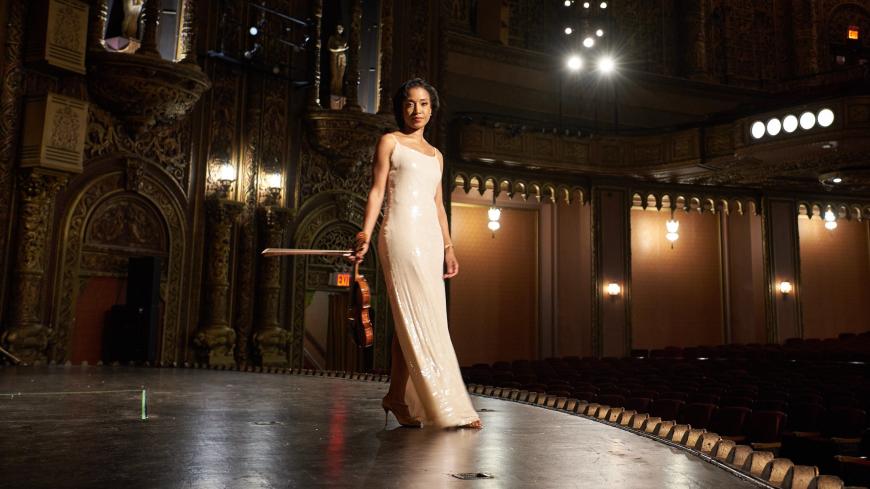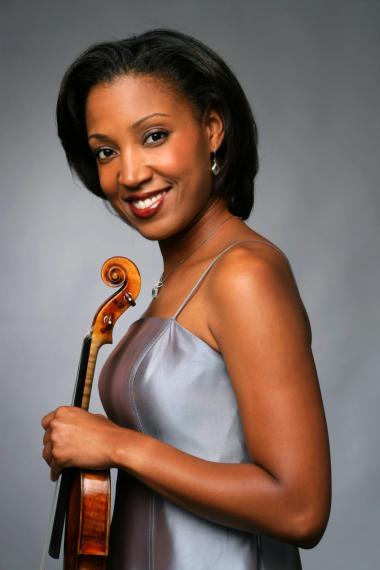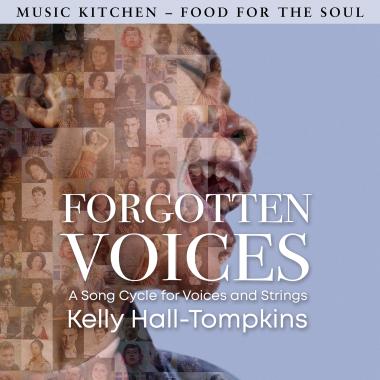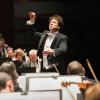
Kelly Hall-Tompkins is an entrepreneur — not in the usual musical sense of being in charge of her own career and playing a variety of gigs but in the sense of working mainly on creative projects that she initiates.
“I’ve always liked to create things, to see them through to their conclusion,” the violinist says. “I think I have leadership qualities, and I like to follow my creative impulses to their logical conclusion.”
It’s not how she envisioned her career. A self-described “classical nerd,” she came out of South Carolina into the orchestral world at the Eastman School of Music in Rochester, New York, and then at Manhattan School of Music, where she was as a concertmaster for both of MSM’s orchestras while also trying out for a section position with the New York Philharmonic. (She was the runner-up.)
The soloist was in her, though. She so impressed the German composer Siegfried Matthus in a performance of his Manhattan Concerto, conducted by Kurt Masur at MSM, that Matthus adapted the piece for her. He wrote a violin concerto a decade later, and Hall-Tompkins gave the U.S. premiere in 2016 with Michael Morgan and the Oakland Symphony. As she was beginning to stretch her soloist wings in the 2000s, she spent five years in a string quartet formed by bluegrass/classical composer Mark O’Connor.
For her third studio album, Imagination (2014), which combined Eugène Ysaÿe’s Sonata No. 6 in E Major with her own arrangement of the Leslie Bricusse-Anthony Newley tune “Pure Imagination” (from the movie Willy Wonka & the Chocolate Factory), Hall-Tompkins released two of the earliest classical music short videos. A year later, she was making news and local TV appearances when she played the fiddler’s music in the 2015 Broadway revival of Fiddler on the Roof directed by Bartlett Sher. That spawned Hall-Tompkins’s fourth studio album, with new music inspired by the musical.
Her work has garnered her a Sphinx Medal of Excellence (2017), a Naumburg International Violin Competition honorarium prize, and a Concert Artists Guild career grant. She’s also been giving commencement addresses recently, one of them at her alma mater, Eastman, and one at Adelphi University, where she was awarded an honorary Ph.D.
This is all in addition to her nonprofit, Music Kitchen: Food for the Soul, which brings in professional musicians to give free concerts to unhoused people staying in shelters. In another project, just prior to the pandemic, Hall-Tompkins commissioned a song cycle from 15 different composers, based on anonymous testimony and feedback she collected through the years from individuals served by the nonprofit.
In the meantime, she is in the Bay Area to play Wynton Marsalis’s Violin Concerto with the California Symphony and Music Director Donato Cabrera this weekend, Sept. 30 – Oct. 1, part of a program that also includes Juan Pablo Contreras’s MeChicano, Ruth Crawford Seeger’s Rissolty Rossolty, and Aaron Copland’s Appalachian Spring.

In conversation with SF Classical Voice, Hall-Tompkins discussed the concerto first, but she has a lot going on. The pandemic, she says, “actually was a time of flourishing for me because I had so many serious avenues of creative endeavor and collaboration. I set out to explore all of those almost more than ever before, and I developed and continued more projects than at any point in my career.”
How did the meeting with Wynton Marsalis come about? Did he just contact you?
No, not at all. The piece was not written for me but for another violinist [Nicola Benedetti, who made a recording of the concerto in 2019]. I was contacted by the Madison Symphony in Wisconsin because they had contacted [Benedetti] and she wasn’t available. And I had never heard of the piece before. I took a listen and was floored and fell in love with it. And I just kind of sent the vibe out into the world that I adore this piece and I want to be playing it more. So, before I had even played the first performance, Donato Cabrera texted me and said, “Are you enjoying the Marsalis? Would you like to do it with us?” We have actually had the opportunity to perform it already at his other orchestral post, the Las Vegas Philharmonic, and we did that on opening night last season, so I’m thrilled to work with him again.
What do you love about the concerto?
What’s not to love? I just adore this piece. It’s a Mahler-sized orchestra, a Mahler-sized piece. It shows Wynton Marsalis’s incredible breadth of knowledge of the classical canon because of the numerous influences that are heard in the music, while [staying] distinctly in his own voice. And then he seamlessly intertwines that with his vast knowledge and experience of American styles of music, like with influences from Duke Ellington. There’s even ragtime, old-time fiddle music, and blues, obviously. The entire piece sets in the center of it this “Blues” movement.
It felt like the language that I knew already, and I couldn’t wait to speak it.
When it comes to blues and those other styles, are you completely comfortable with them, or was it a learning curve?
It’s in there, and I’m already known as a violinist who pushes the boundaries of genres. I would not have ever anticipated that that would have happened in my career, but it did happen, and I am that person. While being an absolute classical geek, I have a broad-minded, visceral feel for other styles of music.
I grew up Lutheran, but I know the influence of the Black Southern Baptist church, which comes into the “Blues” movement of the Marsalis concerto, from family. My grandmother is Baptist, and I grew up visiting her church [and know] just the whole Southern tradition that’s in there. And then I found myself playing for five years with Mark O’Connor, playing his American roots-influenced classical music, and it just came out of me in ways that I didn’t know were in there.
As a child, I actually met Marsalis when he came to my town. I went to an outdoor jazz concert/music festival with my parents, and I remember distinctly getting a chance to meet him backstage. I had a set of notecards with like a music note and my name printed on them, and I had him sign an autograph [on one], and he said, “That’s cute.” I grew up with some of his recordings in my household. I grew up with Isaac Stern, Itzhak Perlman, Yo-Yo Ma, and Wynton Marsalis. Those were the recordings, mostly Marsalis’s classical recordings, but I was very well aware that he was this great jazz artist.
Let’s talk about your new album, Forgotten Voices.
In terms of projects that I’ve been working on, that’s certainly a foremost one that started before the pandemic and was realized in a rather substantial way after, and it continues on.

Forgotten Voices is a project of Music Kitchen. I conceived of this project to basically feature the feedback and comments that we had received over the first 15 years and invited 15 award-winning composers to select from that feedback and set it to music [to make] a composite song cycle. I had the idea to premiere those songs exclusively for the shelter clients around New York City first, like individually. So, we did that, starting in January 2019 and continuing for 15 months, and yes, that means we ran directly into the pandemic.
The original project was supposed to have “culminated” — although my mind doesn’t work like that — in a major world premiere, for which we partnered with Carnegie Hall. Of course, we knew that was not going to be possible [after March 2020], but we did carry the project through the pandemic in a variety of ways. Fortunately, that year before was the first time in Music Kitchen’s history that we video-recorded each of the performances. So, we relied on that to share the material both with shelter clients and also, for the first time ever, with the general public. That was a really exciting new development for Music Kitchen: to have a reason to present to the public. And then we had a sold-out concert at Zankel Hall on March 31, 2022.
Is that the project that led directly to the film Face to Face: Forgotten Voices Heard?
Well, the film I conceived of to be debuted at the Carnegie Hall premiere of the song cycle. And that was because the comments that we set to music span Music Kitchen’s first 15 years and they’re mostly anonymous — really it’s a kind of archival wailing wall of [what] our clients [have experienced]. But I [also] had the idea to interview in real time the shelter clients who wanted to go on camera and show their faces and tell their stories. And that’s how I conceived of Face to Face: Forgotten Voices Heard.
After the Carnegie Hall premiere was over, I thought, “Well, I certainly don’t want this to be a one-off and just go back in the can. I think it’s too powerful and too important.” I started submitting to international film festivals, and we’ve had 19 prizes and official selections, from Stockholm, Sweden, to Atlanta, Georgia, to Napa Valley in California. It was shown at the Los Angeles Documentary Film Festival — and they actually provided us with a wonderful video of audience feedback.
What music do you feel called upon to champion?
I play the standard repertoire, but at the moment I find myself playing a lot of new music, from the Music Kitchen project through the pandemic, when I premiered four pieces, one of them written by me.
You’re a composer now?
Yeah, it was a totally unexpected invitation through one of my Broadway colleagues [from Fiddler on the Roof]. We directed this project for, I think it was, a Shabbat series that he was producing — 12 months of monthly content. I basically was asked to write a piece that would bring to life this poem by actor Daniel J. Watts. Daniel was in the show Tina, about Tina Turner, when the pandemic shut everything down.
The rabbi had told us what [sort of material] she was interested in for this [Shabbat series], and Daniel said, “Well, I wrote something already, and I wonder if it might be of interest to you,” and he read it to us. It’s called “The Gatherers,” and the rabbi said, “That’s perfect.” And so they turned to me and said, “Kelly, can you coordinate the music?” And I said, “Coordinate? You don’t coordinate music. I have to write something.” [I thought,] “Not exactly my day job, but let me see what I can do.”
When people used to ask me as a kid, “Are you a composer?” I would say no. And as soon as we got home, my mom would say, “Why did you say that?” I’d say “What do you mean? That I’m not a composer? ’Cause I’m not.” She’d be like, “You don’t know that.” And I was like, “I think I do know.” But it turns out my mom was right.
More importantly, I’m really excited to champion [another] work, which was written for me by composer Jeff Beal. He and I were both Eastman School of Music honorees at exactly this time last year. Little did I know that his wife, Joan, had been following my work, and they had actually attended several of my performances. They attended the Forgotten Voices premiere in Carnegie Hall. I didn’t even know them yet. Joan was on my mailing list, and she was telling her husband, this five-time Emmy-winning composer for hit TV series like House of Cards and Monk and several films, [about me]. Joan introduced me to him, and we said, “It’d be great to work together.” Sometimes people just say that and don’t really mean it. But we’re both cut from the same cloth, and we took off with that. I can scarcely believe that we just met a year ago and the piece [already] is written, I’ve learned it, and we have a world premiere [scheduled]. We expanded the collaboration to include the conductor Leonard Slatkin. [The world premiere will be] with the St. Louis Symphony, and the European premiere and recording [will be] in Spain. And that’s all coming up in the next five months.




